
ПОСОБИЕ_English_for_economists_посл
..PDF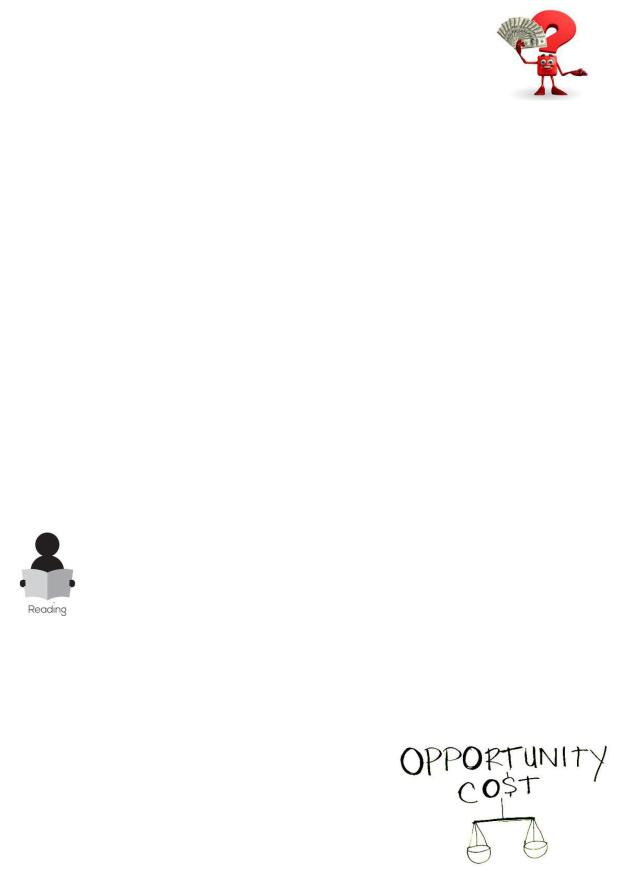
2. Read the words and learn them by heart. Make up your own
sentences with them.
1. Opportunity cost – «цена выбора», альтернативные издержки,
издержки неиспользованных возможностей;
2.To forgo – отказываться от чего-либо, воздержаться от;
3.Value – ценность, важность, полезность
4.To value – оценивать, расценивать
5.Valuable – ценный, полезный, дорогой
6.To spend (spent, spent) – тратить, расходовать, проводить (время)
7.To expect – ожидать, ждать, рассчитывать
8.Purchase – покупка, приобретение
9.To purchase – покупать, приобретать
10.Price – цена, ценность
11.Fee – плата за услуги, гонорар, вознаграждение
12.Tuition – обучение, сумма приобретенных знаний
13.Endeavour – область деятельности
14.To sacrifice – жертвовать, приносить жертву, терять
3.Read the text 1B, translate it and compare your ideas in ex.1 with the facts.
Opportunity Cost
It is within the context of scarcity that economists define what is perhaps the most important concept in all of economics, the concept of opportunity cost. Opportunity cost is the value of the best alternative forgone in making any
choice.
The opportunity cost to you of reading the remainder of this unit will be the value of the best other use to which you could have put your time. If you choose to spend $20 on a potted plant, you have simultaneously chosen to give up the
benefits of spending the $20 on pizzas or a paperback book or a night at the movies. If the book is the most valuable of those alternatives, then the opportunity cost of the plant is the value of the enjoyment you otherwise expected to receive from the book.
http://superprofs.com/blog/wp-content/up
11

The concept of opportunity cost must not be confused with the purchase price of an item. Consider the cost of a college or university education. That includes the value of the best alternative use of money spent for tuition, fees, and books. But the most important cost of a college education is the value of the forgone alternative uses of time spent studying and attending class instead of using the time in some other endeavor. Students sacrifice that time in hopes of even greater earnings in the future or because they place a value on the opportunity to learn. Or consider the cost of going to the doctor. Part of that cost is the value of the best alternative use of the money required to see the doctor. But, the cost also includes the value of the best alternative use of the time required to see the doctor. The essential thing to see in the concept of opportunity cost is found in the name of the concept. Opportunity cost is the value of the best opportunity forgone in a particular choice. It is not simply the amount spent on that choice.
The concepts of scarcity, choice, and opportunity cost are at the heart of economics. A good is scarce if the choice of one alternative requires that another be given up. The existence of alternative uses forces us to make choices. The opportunity cost of any choice is the value of the best alternative forgone in making it.
(Source: http://www.saylor.org)
4.Say if the sentences concerning Text 1B are true or false.
1.Opportunity cost is the value of the worst alternative forgone in making any choice.
2.If you choose to spend $20 on a potted plant, you have simultaneously chosen to give up the benefits of spending the $20 on pizzas or a paperback book or a night at the movies.
3.The concept of opportunity cost is the same as the purchase
price of an item.
4.A good is scarce if the choice of one alternative requires that another be given up.
5.The absence of alternative uses forces us to make choices.
5.Answer the following questions.
1.What is the most important concept in all of economics according to economists?
2.What is the opportunity cost?
3.How can we measure the opportunity cost?
12

4.What economic notion must not the opportunity cost be confused with?
5.What value does university education include?
6.What concepts are at the heart of economics?
6.Give English equivalents of the following words and word combinations from Text 1B.
Цена наилучшей альтернативы, остальная часть урока, потратить свое время, не
следует путать, отказаться от выгоды, вечер в кино, самое ценное, стоимость утраченной возможности, покупная цена, в надежде на большие заработки, взвесить возможность,
деньги, требуемые для визита к врачу.
7. Using vocabulary in ex.2 match the words with their definitions.
Word |
|
Definition |
|
|
|
|
|
1. value |
|
a. the act or process of buying smth. |
|
|
|
|
|
2. to spend |
|
b. an amount of money that you pay for professional advice or services. |
|
|
|
|
|
3. purchase |
|
c. to think or believe that smth. will happen or that smb. will do smth. |
|
|
|
|
|
4. price |
|
d. how much smth. is worth in money or other goods for which it can |
|
|
|
be exchanged. |
|
|
|
|
|
|
|
|
|
5. fee |
|
e. an advantage that smth. gives you. |
|
|
|
|
|
6. to expect |
|
f. the amount of money that you have to pay for smth. |
|
|
|
|
|
7. cost |
|
g. a thing that you can choose to do or have out of two or more |
|
|
|
possibilities. |
|
|
|
|
|
|
|
|
|
8. alternative |
|
h. the amount of money that you need in order to buy, make or do smth. |
|
|
|
|
|
9. benefit |
|
i. to give money to pay for goods, services, etc. |
|
|
|
|
|
8. Discuss with the group the following topics:
Opportunity cost
To understand the opportunity costs of your options it is recommended to list the choices and identify their advantages and disadvantages. Read the following paragraph and answer the questions to explain how you might choose to use your
scarce time and money.
It‘s Sunday morning and you‘re going to meet your friends and spend time joyfully together.
Then you get two phone calls that make you stop and think. Firstly, a friend calls you to invite to
13
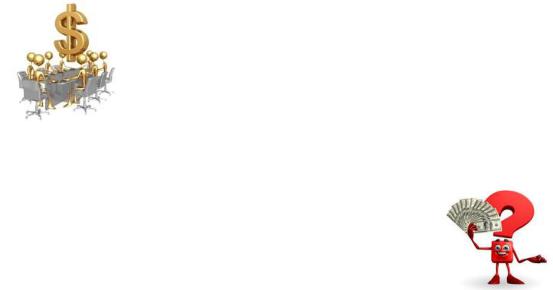
an-all day music festival where your favourite band will play. With transport expenses, tickets to the show, and lunch, you figure you‘ll spend $50, which will put a dent in the money you‘re saving for your dream trip. Second, your close relative calls offering you the opportunity to help paint their apartment. He will pay you $75 for the day of work. What will you do? Explain your decision.
a) List your choices (a. _______ b. _______ c. ________ ). b) Describe the advantages and disadvantages of each choice.
Text 1C
1.Before you start.
What is the difference between microeconomics and macroeconomics?
What are their goals?
2.Read the words and learn them by heart. Make up your own sentences with them.
1.To divide – делить, разделять
2.Realm – область, сфера
3.Distinction – различение, разграничение
4.To consume – потреблять, расходовать
5.Consumer – потребитель, покупатель, клиент
6.Impact – влияние, воздействие, эффект
7.Market – рынок, базар
8.Aggregate – совокупный, сгруппированный
9.Real estate – недвижимость, недвижимое имущество
10.To end up – прекратиться, закончить
11.Discount – скидка, дисконт
12.To regard – рассматривать, считать
13.The rate of inflation – уровень инфляции, темп инфляции
14.To increase – увеличиваться, повышать
15.To decrease – уменьшаться, сокращать
16.Output – продукция, выпуск
17.Employment – занятость, служба
18.Unemployment – безработица, незанятость
14
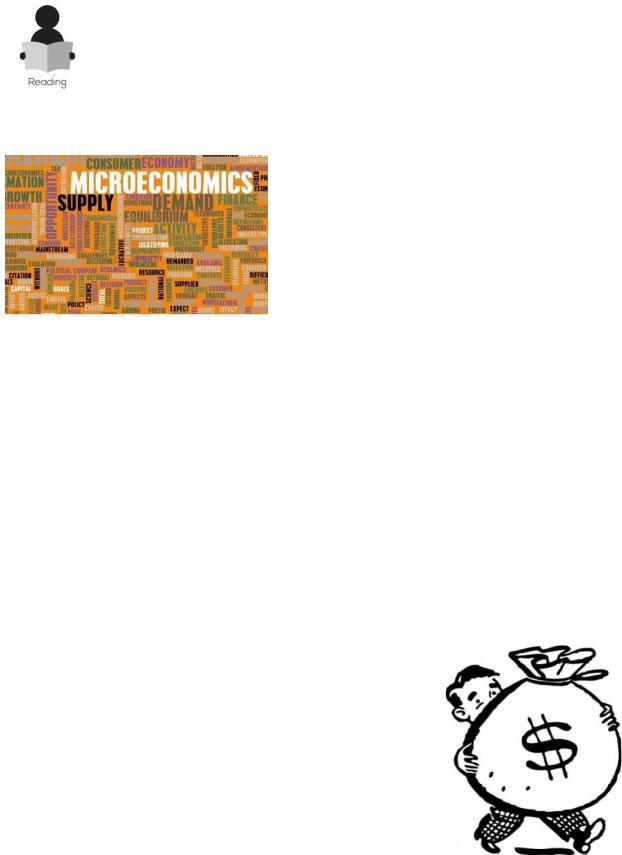
3. Read the text 1C, translate it and compare your ideas in ex.1 with the
facts.
Microeconomics and Macroeconomics
The field of economics is typically divided into two broad realms: microeconomics and macroeconomics. It is important to see the distinctions between these broad
areas of study.
Microeconomics is the branch of economics that focuses on the choices made by individual decision-making units in the economy – typically consumers and firms – and the impacts those choices have on individual markets. Macroeconomics is the branch of economics that focuses on the impact of
choices on the total, or aggregate, level of economic activity. Why do tickets to the best concerts cost so much? How does the threat of global warming
affect real estate prices in coastal areas? Why do women end up doing most of the housework? Why do senior citizens get discounts on public transit systems? These questions are generally regarded as microeconomic because they focus on individual units or markets in the economy.
Is the total level of economic activity rising or falling? Is the rate of inflation increasing or decreasing? What is happening to the unemployment rate? These are questions that deal with aggregates, or totals, in the economy; they are problems of macroeconomics. The question about the level of economic activity, for example, refers to the total value of all goods and services produced in the economy. Inflation is a measure of the rate of change in the average price level for the entire economy; it is a macroeconomic problem. The total levels of employment and unemployment in the economy represent the aggregate of all labor
markets; unemployment is also a topic of macroeconomics.
Both microeconomics and macroeconomics give attention to individual markets. But in microeconomics that attention is an end in itself; in macroeconomics it is aimed at explaining the movement of major economic aggregates – the level of total output, the level of employment, and the price level.
We have now examined the two branches of economic way of thinking: microeconomics and macroeconomics.
(Source: Principles of Microeconomics http://www.saylor.org)
15

4.Say if the sentences concerning Text 1C are true or false.
1.There exist three broad realms of the field of economics: micro-, middleand macroeconomics.
2.Macroeconomics studies economy as a whole.
3.Microeconomics studies the economic behaviour of individual firms.
4.Economics is concerned with production, distribution, and consumption of goods and services.
5.The question of how the threat of global warming affects real estate prices in coastal areas is the problem of macroeconomics.
6.The study of the rate of inflation refers to microeconomic sphere.
7.The total levels of employment and unemployment in the economy are a topic of macroeconomics.
5.Answer the following questions.
1.What is the field of economics typically divided into?
2.What does microeconomics focus on?
3.What individual decision-making units in the economy do you know?
4.What does macroeconomics focus on?
5.What questions are generally regarded as microeconomic? Why?
6.What problems are regarded as macroeconomic? Why?
7.What do both microeconomics and macroeconomics give attention to? What are the peculiarities of this attention?
6.Give English equivalents of the following words and word combinations from Text 1C.
Сфера экономики, две широкие области, хозяйственная единица с правом принятия
решений, отдельные рынки, влияния выбора, потребители, экономическая активность,
общий или совокупный уровень, влиять на цены на недвижимость, отказаться, пожилые люди, получать скидки, система общественного транспорта, уровень инфляции, рост и падение экономической активности, уровень безработицы, общая стоимость всех товаров и услуг, средний уровень цен, рынок труда, самоцель, весь выпуск продукции,
совокупные экономические показатели.
16
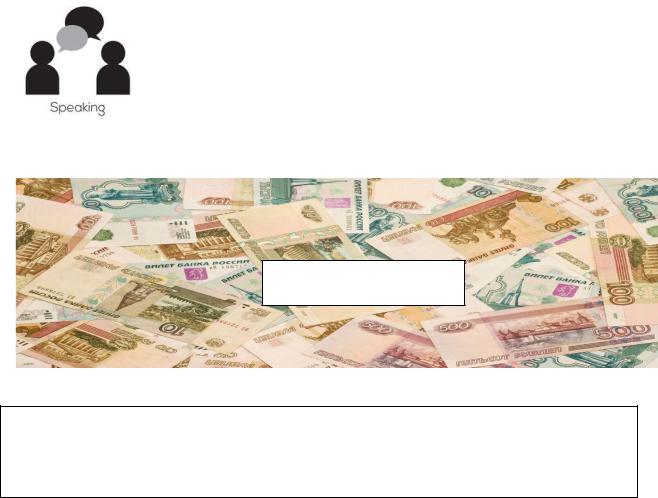
7. Using vocabulary in ex.2 match the words with their definitions.
Word |
|
Definition |
|
|
|
1. to consume |
|
a. easy to sell; attractive to customers and employers. |
|
|
|
2. market |
|
b. to become or make smth. become smaller in size, number, etc. |
|
|
|
3. to increase |
|
c. the fact of a number of people not having a job. |
|
|
|
4. to decrease |
|
d. a person who buys goods or uses services. |
|
|
|
5. unemployment |
|
e. an amount of money that is taken off the usual cost of smth. |
|
|
|
6. consumer |
|
f. an open area or building where people meet to buy and sell goods. |
|
|
|
7. marketable |
|
g. to eat or drink smth. |
|
|
|
8. discount |
|
h. to become or to make smth. greater in amount, number, value, etc. |
|
|
|
8.Discuss with the group the following topics:
1.Explain the key-terms of microand macroeconomics.
2.Study the following economic terms: labor economics, international economics, agricultural economics, public finance, applied welfare economics. Explain them to your groupmates (use internet for additional
information).
FINAL TASKS
1. Fill in the gaps using the words below:
Fee, increased, decreased, price, value, purchase, consumption, spent, consume, require, resources, expected, economics, services, goods, production
1. She studied politics and ______ at Cambridge. 2. This car model went out of _____ in 2000. 3. The cargo delivered _____ in time. 4. The supply of water, gas, and electricity are
17
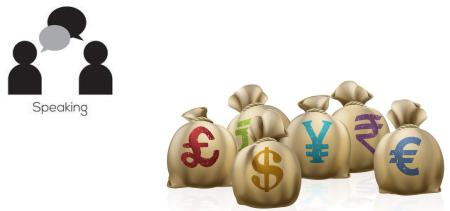
essential _____. 5. Natural _____ in this region are quite diverse and rich. 6. She was advised to reduce her chocolate ______. 7. Little babies _____ a lot of love and attention. 8. Every year private property increases in _____. 9. He _____ a great amount of money on a new car. 10. Keep your receipt as proof of _____. 11. Children over seven must pay full _____ for the ticket. 12. House prices are _____ to rise sharply. 13. In winter people _______ large amounts of heat and electricity. 14. The rate of inflation has ______ by 6% since the beginning of the year. 15. The number of new students ______ from 180 to 150 this year. 16. Does the bank charge a
_____ for setting up the account?
2.Translate the following sentences using the vocabulary of Unit 1.
1.Я выполню работу как можно экономнее. 2. Производство новых вертолетов начнется в этом году. 3. В нашем районе открылся новый магазин с низкими ценами.
4.Товары в этом магазине довольно дорогие; не каждый может позволить себе купить их.
5.Стоимость украденных товаров составила 3 млн. рублей. 6. Наша компания оказывает финансовые и юридические услуги. 7. Сервис в этом отеле оставляет желать лучшего.
8.Мы договорились объединить наши ресурсы (to pool one‘s resources). 9. У компании нет свободных средств, чтобы поменять компьютеры. 10. Потребление тепла и электричества возрастает в холодное время года. 11. Потребуется, чтобы все абитуриенты сдали вступительный тест. 12. Победитель получит приз стоимостью $10 000. 13. Я потратил все свои деньги. 14. Они приобрели землю под строительство коттеджа за 1 млн. рублей.
15. Цены на молочные продукты снова возрастут. 16. Мы ожидаем рост цен на продукты питания (a rise in food prices) этой осенью. 17. Люди не ожидали, что темпы инфляции будут такими высокими.
3.Speaking. Make a presentation on the following topics:
A historical outline of economics as a science.
Outstanding economists and their theories.
18
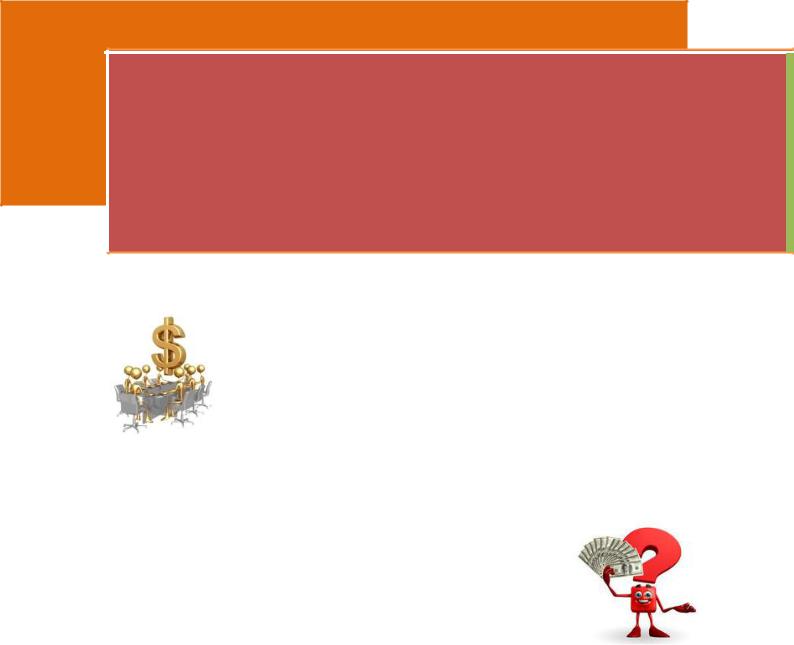
Unit 2.
Factors of Production
Text 2A
1.Before you start.
Define the three factors of production – labor, capital, and natural resources.
Explain the role of technology and entrepreneurs in the utilization
of the economy‘s factors of production.
2.Read the words and learn them by heart. Make up your own sentences with them.
1.To concern – иметь отношение к, беспокоиться
2.Satisfaction – удовлетворение, удовольствие
3.To satisfy – удовлетворять, отвечать (требованиям,
стандартам)
4.To derive – получать, извлекать, происходить
5.To pursue – следовать, заниматься (чем-либо)
6.Utility – польза, общественная полезность
7.Labor – работа, труд
8.Capital – капитал, состояние
9.Natural resources – природные ресурсы
10.To pool one’s resources – объединять свои ресурсы
11.Effort – усилие, попытка
12.To apply – применять, употреблять, обращаться с просьбой, просить (о чем-либо)
13.Application – практические применение, употребление
14.Core – суть, сущность, сердцевина, ядро
15.To enforce – усиливать, настаивать на
16.To gain skills – приобретать навыки
17.To acquire – приобретать, получать, овладевать (каким-либо навыком)
19
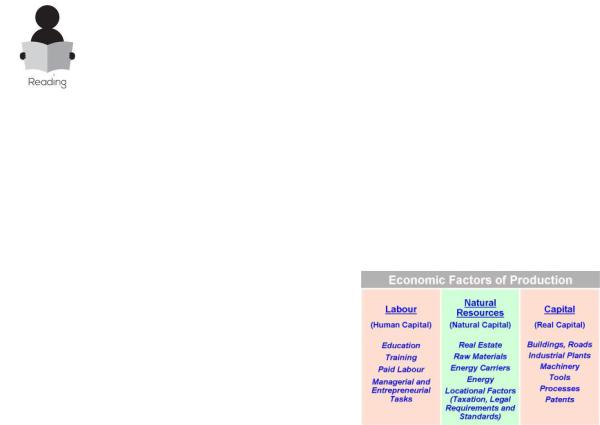
18.Cleaver – кухонный топорик
19.Hook – крючок, крюк
20.Grinder – дробилка, кофейная мельница
21.To butcher – забивать, резать, разделывать мясную тушу или рыбу
22.Screwdriver – отвѐртка, шуруповѐрт
23.Wrench – дѐргание, выкручивание
24.Score – счѐт
25.Assets – активы баланса, имущество, капитал
26.Stocks – акции, акционерный капитал
27.Bonds – облигации
3. Read the text 2A, translate it and compare your ideas in ex.1 with the
facts.
Factors of Production
Choices concerning what goods and services to produce are choices about an economy‘s use of its factors of production, the resources available to it for the production of goods and services. The value, or satisfaction, that people derive from the goods and services they consume and the activities they pursue is called utility. Ultimately, then, an economy‘s factors of production create utility; they serve the interests of people.
The factors of production in an economy are its labor, capital, and natural resources. Labor is the human effort that can be applied to the
production of goods and services. People who are employed or would like to be are considered part of the labor available to the economy. Capital is a factor of production that has been produced for use in the production of other goods and services. Office
buildings, machinery, and tools are examples of capital. Natural https://gerdzeitler.files.wordpress.com resources are the resources of nature that can be used for the production of goods and services.
The three basic building blocks of labor, capital, and natural resources may be used in different ways to produce different goods and services, but they still lie at the core of production.
Labour
Labor is human effort that can be applied to production. People who work to repair tires, pilot airplanes, teach children, or enforce laws are all part of the economy‘s labor.
20
